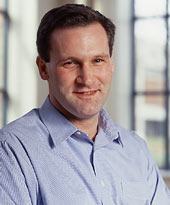Stepping Outside the Walls of a Classroom
•
Jeanne Siler
| “This is something serious. The research and planning that goes into the application process can seem quite onerous, but students who have done externships tell us the effort is worth it.” |
For almost two decades, the Law School has offered third-year students the chance to take a semester’s break from the structured routine of books and exams via externships through the External Studies Program.
“Students have done some incredibly interesting projects as part of the externship program,” said Law Professor Barbara Armacost, chairman of the curriculum committee that approves students’ externship applications. “Externships allow students to do on-site research on topics of special interest to them.” Program guidelines encourage students “to do unusual types of research” and, moreover, research that “cannot practically be done in Charlottesville.” The intent is to enable an in-depth research opportunity greater than what can be typically accomplished in the classroom or during a summer internship.
When students complete their externships and research papers, they receive 12 credits and a semester’s residence credit toward their J.D. “That’s quite a lot,” said Armacost. “This is something serious. The research and planning that goes into the application process can seem quite onerous, but students who have done externships tell us the effort is worth it.”
Since 1988, 27 students have experienced an externship, many with rewarding results, as demonstrated by the tales of five Law School students who participated in externships last fall. Here, third-year students Sharon Gilmore Garner, Saejung Lee, Cristie Leigh March, Michael Signer, and Althea Kendall Smiley share their experiences.
 |
| Sharon Garner |
SHARON GILMORE GARNER didn't really expect her externship with the Chesapeake Bay Foundation to get her out on the water very often as she explored how land use initiatives in Virginia and Maryland have been helping the states comply with goals set forth in the 1987 Chesapeake Bay Agreement. “I thought I would have to drive around to get a lot of data,” she said, but unfortunately learned instead that “the data doesn’t exist.”
Garner hoped to not only aid Foundation staff with a large litigation project challenging two nutrient pollution permits, but also to create an empirical study of two statutes, the Chesapeake Bay Preservation Act enacted in Virginia and the Maryland Critical Areas Act.
“I discovered that neither state is on track to come into compliance with land use goals outlined in the agreements,” she said. Not only are there many inconsistencies in the agreements, but she was disappointed to learn “no one was even trying to meet the sprawl goal. No one even has a way to measure or define what sprawl really is. It was very disheartening.”
Despite discovering Virginia’s “obsession with protecting property rights rather than the resource,” Garner found her externship personally rewarding “since I was fully involved in a non-governmental organization (NGO) and saw firsthand the plethora of institutional challenges present in a multi-state treaty.”
WORKING FROM A BASE IN MADISON, Wisconsin, Saejung Lee studied a non-traditional elder care advocacy system, part of Wisconsin’s legal services implementation of the federally-funded Older Americans Act. With a background in social work in New York City, Lee’s externship has helped solidify an interest in working with immigrants, including older generations.
“A lot of the elderly live alone. They are isolated in a community. That is also true of Asian Americans and other recent immigrants. Being isolated keeps them unaware of resources available to them. Many times an older person will not know of their basic rights, much less an older immigrant resident,” Lee explained, adding that mental health laws often overlap in their coverage for the two groups. Moreover, complex application and grievance procedures or burdensome paperwork often prevent these vulnerable populations from receiving entitled private or public benefits, benefits which “can make a vital difference” to their ability to remain self-sufficient, said Lee.
Wisconsin’s delivery model uses county-based lay advocates to assist elderly with legal needs. This method enables more personal and financial commitments at a local level, but also requires a high level of cooperation between lay workers and attorneys.
A South Korean raised in Bangladesh, Lee furthered her knowledge of Asian languages during anthropology fieldwork in Taiwan as an undergraduate. She has also learned the Southeast Asian language, Hmong, and Spanish to help her with the immigrant populations of Madison. Despite a focus on Wisconsin last semester, she also studied other states’ legal delivery models; the analysis of hundreds of survey results will complete her research project.
 |
| Cristie Leigh March |
CRISTIE LEIGH MARCH spent her semester working in Washington, D.C., hardly unfamiliar territory. But her experiences as an extern with the government’s Overseas Private Investment Corporation (OPIC), helped her gain valuable insights into how the agency helps U.S. businesses develop new foreign markets as well as assist in managing risks associated with overseas business investments, such as currency instability or political violence.
“From the first day I arrived, I was included in a number of projects that ranged from the beginnings of a project finance deal for a small business venture to a compensation determination process for a series of political risk insurance claims,” said March.
A combination JD/MBA student, March found the externship especially rewarding because “It bridged some of the gaps between business and law.” She also appreciated the autonomy she had and the willingness of attorneys to discuss their practices. “I was invited to attend workshop lunches and presentations, which gave me the opportunity to see how different departments within OPIC collaborated to monitor projects and approve new ones.”
Her research paper looks at how terrorist concerns have affected the nature of political risk insurance claims for OPIC. She concluded the higher risk profile makes it that much more important for OPIC to use tighter corporate governance metrics so that it can withstand greater than normal losses.
 |
| Michael Signer |
MICHAEL SIGNER, an Arlington, Virginia, native, studied politics at Princeton and Berkeley before heading to law school, and has been active in Virginia politics for at least a decade. To earn credits toward his J.D. degree by externing in the Governor’s Office last fall and to be treated like a member of Warner’s staff, was “just an extraordinary educational experience for me,” he declared.
“I find it very satisfying to practice law in the way that the stakes are immediate and public,” said Signer. “The interplay between the law and policy was fascinating, and it was exciting to see policy being developed in real time.” Signer was also able to extend his earlier work with Law School Professor A.E. Dick Howard’s two-year-old Legal Fellows program that allowed a small number of students to work half-days in Richmond.
This fall Signer also researched the relationship and tensions between a separately elected governor and attorney general. The great majority of attorney generals are elected, and Signer believes such an internal check-and balance within the executive branch is not really necessary. Moreover, he contends this model is a set-up for constitutional tension especially when—as is the case currently in Virginia—the two come from different parties.
As attorneys general become more entrepreneurial, he said, it increasingly happens that conflicts develop between the two offices. By statute, the attorney general has to represent the state, but also has to issue advice on the office’s interpretation of, for example, what Michigan’s recent affirmative action case might mean to Virginia’s state universities.
 |
| Althea Smiley |
PERTH, AUSTRALIA IS HALFWAY around the world from Charlottesville, but Althea Kendall Smiley earned her fall credits there at Murdoch University’s School of Law where Professor Antonio Buti supervised her studies of discriminatory legislation. A specialist in guardianship and family law, the professor has worked extensively with the rights of native Australians who were forcibly removed from their families and homelands to be raised as “whites,” frequently in institutional settings.
The plight of these ‘Stolen Generations’ received international attention through the popular 2002 film “Rabbit-Proof Fence.” “Unfortunately,” says Smiley, unlike the two young girls in the film who return to their families, “most children weren’t able to.” The government is attempting to make reparations following an inquiry that determined the removals were “racially discriminatory, breached international legal obligations, and amounted to gross violations of human rights, including genocide,” said Smiley. Initial reparations have involved allocations for family reunifications and for counseling programs.
“These people are suffering from a number of mental health issues. They are not part of the white society they were raised in, but they also don’t have the cultural knowledge of their original families,” said Smiley, a Lynchburg native and former anthropology major at Washington & Lee University. The removals also caused depression and alcohol dependencies in the now-grown children and damaged parenting skills—the result, she said, of being raised in abusive, non-loving situations.
Smiley compiled a legal history of the discrimination, and interviewed many indigenous Australians about their experiences which will be forwarded to the offices of Aboriginal Legal Services of Western Australia. Her research paper concludes further reparations are still necessary because even if the current individuals in today’s government are not responsible for the past actions of others, “the government is still that same body,” said Smiley.




